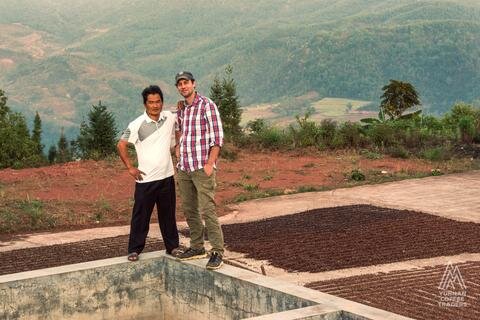Never in the history of the world has it been easier to buy products from halfway around the world. Our global supply chain networks are tighter and more efficient than ever. Still, so much can get overlooked in the process of getting products from one part of the world to the other, and coffee is no exception. Fair wages and quality products are not always guaranteed in the current status quo. Many consumers have seen the occasional pitfalls of a global market and have developed a preference for locally produced goods. While this is the trend, especially with agricultural products, locally grown options are simply non-existent with coffee. Coffea Arabica, the most commonly consumed species of coffee, can only be grown under particular ecological circumstances (altitude, humidity, distance from the equator). Americans simply cannot grow good coffee locally.
How can coffee roasters like Baba Java be sure we are sourcing coffee ethically? This is not always easy to do, especially since coffee grows in some of the poorest countries in the world. Roasters must do their homework when deciding where they buy their coffee. Green coffee buyers, companies that import coffee from origins and store them to sell to roasters, are typically responsible for the relationships with farmers at origin. The more transparency they can provide for what goes on at the farm, the better. We at Baba Java are fortunate to work with ethical green buyers who are very concerned with transparency and fair wages. Buying from the right green coffee buyers is a great way for roasters to ensure they are helping the global coffee community, but it is not the only one. Direct trade coffee is also a fantastic option.
What exactly is direct trade coffee? Ironically, there is no direct way to answer this question. The term would imply that a strict definition underlies the concept, but it’s actually a bit ambiguous. As we have described on our blog before, coffee goes through many stages of development before it can be poured into your cup. Coffee is the seed of a fruit that grows on a tropical tree. It has to be harvested at the right time, processed (removed from inside the fruit) using the right methods, and then milled and packaged with the right equipment before it even makes its journey to the US. There are many people involved in this process, so direct trade coffee involves a lot more than your typically farmers’ market transaction.
The easiest way to define direct trade coffee is to describe what all falls under that umbrella term. First, buying coffee directly from the farmer obviously qualifies. We do not currently have any such relationships at Baba Java and for good reason. There are very few farmers in the world that can afford to grow, harvest, process, dry mill, and package their product. It nearly always requires a network to produce green coffee. Even if a farmer were to have all of these tools at his disposal, he would also need to have the necessary exporting licenses to move his coffee out of country and the roaster would need the necessary importing licenses to bring it into the US.
As you can see, green coffee importers play a very necessary role in the market. These companies, by holding import/export licenses and helping farmers connect with and maintain coffee processing networks, do the industry a great service.
However, there is another middle road that does not require the use of a traditional green coffee importer: partnering with an in-country mill. Good examples of such a partnership are our relationships with Rayyan Mills for our Yemen Coffee and Yunnan Coffee Traders for our China coffee. While we do not necessarily know the farmers who produce these coffees for us, we are only one relationship removed. For instance, Andrew Nicholson, the founder of Rayyan Mill, knows all of our Yemen coffee farmers personally. Because we know him well, we are privy to virtually unlimited amounts of information regarding our Yemen coffee and the farms on which they are grown. The same is true in China. We don’t know our farmers personally, but we do know their names and everything about their coffee farm because of our relationship with Yunnan Coffee Traders. We also have a relationship like this with Socci coffee, the place where we source our Honduras coffee.

Direct partnership with mills is beneficial for everyone. Roasters do not have to pay for the services of green coffee buyers in these instances. Mills that maintain such relationships typically open a stateside logistics company that holds the required import license and can ship coffee to roasters around the country. Farmers can depend on such relationships because that mill is concerned specifically with their coffee. They only sell what they help process. They are dealing only with their farmers and their customers and are not concerned with anything else that might cause a green coffee exporter to overlook their particular challenges.
These direct partnerships with mills are our eventual goal at Baba Java with all of our coffees. However, this is easier said than done. Some countries, like Ethiopia for instance, heavily regulate their coffee industries to the point that direct mill partnerships are impossible. In light of that fact and the good work that good coffee importing companies are able to do, there will always be a need for such companies. We are certainly indebted to them and thankful for them.
We at Baba Java are determined to source, roast, and serve excellent coffee. Direct trade coffee gives us great assurance in the quality of our product when sourcing. Sourcing in a way that is ethically responsible and promotes complete transparency is a non-negotiable for us. We are as concerned with the taste as we are with the way it was grown and how the farmers are compensated. Direct trade coffee allows us to get the best coffee in the best way, which is why our goal is to eventually trade directly with all of our coffee partners.

